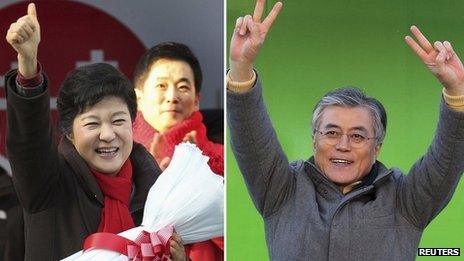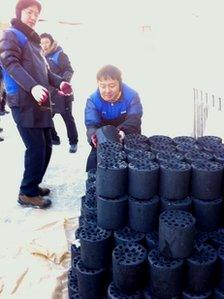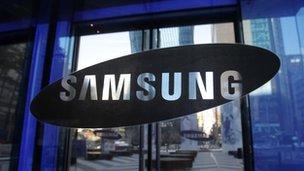Chaebol debate rages in S Korean election
- Published

"Chaebol-bashing" is a staple in elections in South Korea, made worse this year by the rising inequality
Election campaigns in South Korea have a certain rhythm - there are the rallies, the presidential debates, the feverish media speculation. And then there are the chaebol.
South Korea's big family-owned conglomerates are regular targets at election time - "chaebol-bashing" is a well-worn political tactic here. But with wealth inequality on an upward trend, and prices rising, calls for their reform have taken centre-stage this year - not just for the liberal left, but the governing conservative party too.
Park Geun-hye is the conservative Saenuri party candidate. The daughter of the man credited with building South Korea's export-led economy (and blamed for brutally crushing pro-democracy activists), she has joined the opposition in putting "economic democratisation" at the centre of her campaign.
"We haven't paid enough attention to fairness," she told reporters last month. "[Big companies] can invest and create jobs, but they also have some bad practices - they concentrate their business among their own groups, they snatch technology from small companies, and they enforce prices."
Image repair
South Korea's big companies - household names like Samsung, Hyundai and LG - generate about half the country's gross domestic product.
They are seen as the powerhouses of the country's impressive economic rise.
But critics say their business practices squeeze small and medium-sized companies out of existence, and that jobs are lost as a result.
Because of that, the chaebol image is thought to be falling at home, even while remaining gilded abroad.
Won Gi Joon runs a charity that helps companies redistribute some of their wealth back to society.
He says that big companies are increasingly aware of the need to change, in order to protect their public image.
"We're at a time now that, like it or not, these big companies will have to chip in more to improve their image," he told me. "Without doing that, I think it'll be very difficult for them to survive and do business in Korea, because society here has matured."
'Economic democracy'
Wealth inequality here has grown in recent years. Today, the richest tier of South Korean society earns more than 5.7 times the earnings of the poorest tier. That is up from 5.38 times in 2006.
As one early presidential contender (now dropped out of the race) put it, there are two South Koreas - a country of growth and opportunity, and a country without.
Gi Joon's organisation provides a rare link between the two, offering companies a chance to pay and deliver charcoal briquettes to the capital's poorest households, to see them through the winter. In this hi-tech, G20 economy, not everyone has central heating.

Samsung employees deliver briquettes to some of the poorest households
What has made the change this time, some say, is the more mature, more centralised nature of South Korean politics.
"Political democracy [in South Korea] has led to a demand for social and economic democracy," says Moon Jae-in, the presidential candidate for the opposition Democratic United Party.
"The task ahead of us is to build a welfare state. We could not have said that 10 years ago, they would have called us "left-wingers", but there's a political consensus now. We have the right conditions to move towards a welfare state."
'Regulate themselves'
Kim Sung-joo was born into - and then excluded from - one of Korea's richest business families. Now head of a self-made business empire, she describes herself as a "left-wing chaebol" - someone who acknowledges their debt to society.
The old giants of South Korea's economy, she says, need to reform fast - if they are not going to be reined-in by force.
"I really hope that this time the chaebol families can wake up before the government does," she told me. "I hope they wake up to the fact that the chaebol do not come from their great-grandfathers, but from the ordinary people's efforts and sweat."
"They have to learn how to regulate themselves. And, like Bill Gates, donate big money back to society. All the money we have is not ours - we're just the stewards of it. And I'm sure the young generation of those chaebol families can wake up to that."

Samsung, Hyundai, LG and other chaebol account for more than half of South Korea's economic growth
Reforms being discussed by the candidates include limits on cross-holdings, and related-investments, as well as restrictions on the kind of industries open to the major players.
But, at least among the conservative camp, the push to reform the chaebol seems to have softened recently, as worries over South Korea's export-led economy have grown.
And ultimately, that is the problem here - reform of big business, and redistribution of wealth may now be national demands that cross party lines, but with the global slowdown starting to bite, the focus for some voters is, once again, switching back to growth.
After all, a recession here won't help the poor any more than the rich.
But in a country that still relies on a handful of businesses for half its economic growth, a serious economic dip is likely to entrench the status quo, not change it.
And as one commentator said recently, people don't worry about political monopoly anymore, they worry about the economic kind.
- Published18 December 2012
- Published17 August 2011